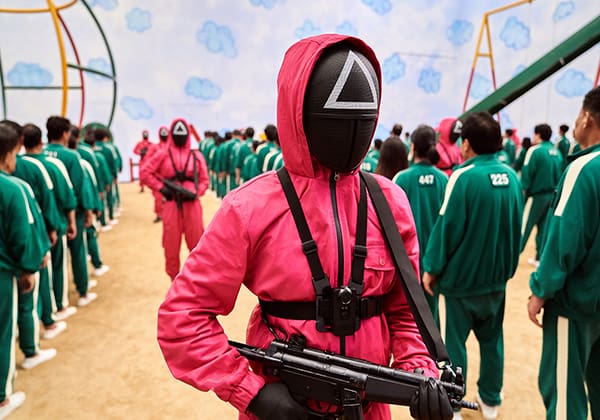Numbered green tracksuits. Arenas, among them a simulated open schoolyard that engulfs its inhabitants. Black masked, bright pink-suited soldiers, moving robotically in tandem. Caskets wrapped in a bow, as if death were a gift.
Since its release on Netflix in September, Squid Game has quickly broken records to become one of the most viewed shows on the platform. This begs the question: what exactly has made the show so popular?
Arguably, it is in part due to its adherence to the dystopian genre. Dystopian texts have proven their popularity throughout time. Notable classics like Brave New World, 1984, and The Handmaid’s Tale have found their way into high school curriculums as socio-culturally significant texts, and have recently been adapted to the small screen. The popularity of dystopian fiction boomed in the 2010s in the Young Adult market, with the worldwide popularity of The Hunger Games. The similarities cannot be ignored: like The Hunger Games, Squid Game operates around the arena, where working class contestants are pitted against one another for the chance of a life of luxury. And it is revealed that, like the citizens of the Capitol in The Hunger Games, Squid Game is funded by the whims of the rich.
But unlike The Hunger Games, Squid Game is not targeted to the Young Adult market. The grit and gore, and its glaring criticism of today’s capitalist society, has allowed it to resonate with audiences far beyond their teens. Classic dystopian texts are set in the future. They show us what might happen if ceaseless production continues. But Squid Game subverts this trope — set in 2021, it paints a picture not of the future, but of the present reality. We watch Squid Game with a fascinated morbidity, knowing that the scenes we watch — of poverty, crippling debt, the income disparity between the 1% and the rest of the world — already plague our society.
Like Brave New World, Squid Game’s insulated society is pseudo-utopic. Players don the same green tracksuits, must conform to an illusory fairness regime, and are all presented with the opportunity to leave behind their life of poverty. When the dictatorial Front Man discovers one of the players has been given an unfair advantage, due to his role in helping soldiers harvest organs in secret, he kills the assailant. “The most crucial element of this place [is] equality,” he says. There is a distinct irony in this utterance — there is a distinct hierarchy in “this place,” one that places the players at the bottom of the pecking order, with no agency over the conditions they are subject to. Circles, triangles, and squares imprinted on the masks of the soldiers establish a clear chain of command.
Unlike the outside world, where players roam a nihilistic wasteland of unemployment, poverty and death, the piggy bank looms above them within the game, bringing a false sense of hope. As it brightens with every “elimination,” it fills with money, motivating players to abandon their morals and lose their humanity in this individualistic race.
Squid Game was rejected for ten years before being made due to claims that it was too unrealistic. But it has emerged at the perfect time: in the context of the pandemic and resulting economic crises, it both addresses pressing societal issues and presents an escape through the absurdity of the game. The focus on childhood games makes Squid Game reminiscent of a simpler time: a time where class issues and our capitalistic society were less relevant to us as children. And for the Western audience, the otherness of Squid Game, being set in Korea, allows us to look at its social commentary with more objectivity — it displaces the critique of capitalism and the idealisation of meritocracy to a country foreign to us, one in which we are not complicit. As we watch players compete on screen, and see their sheer desperation and demoralisation, it almost fills us with a reassurance that as dire as our world is, at least this is still a fantasy. But for how much longer?





